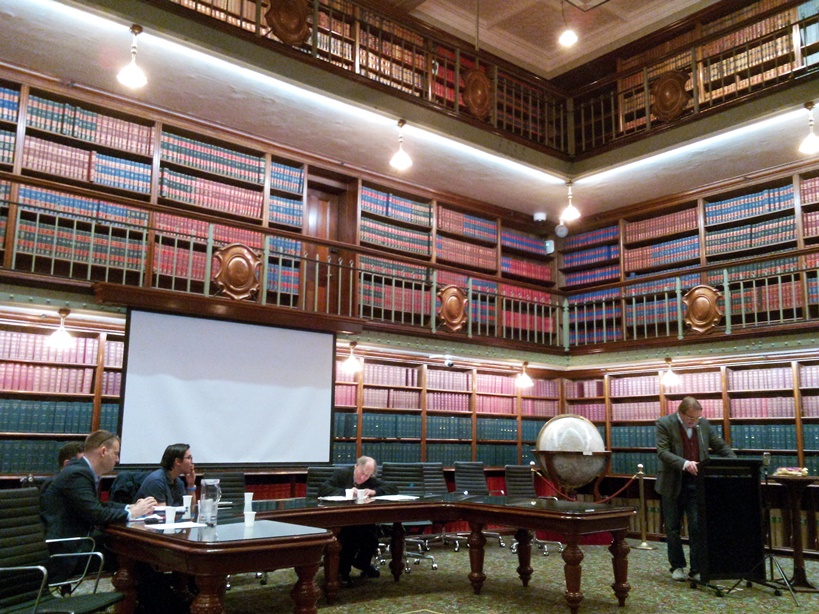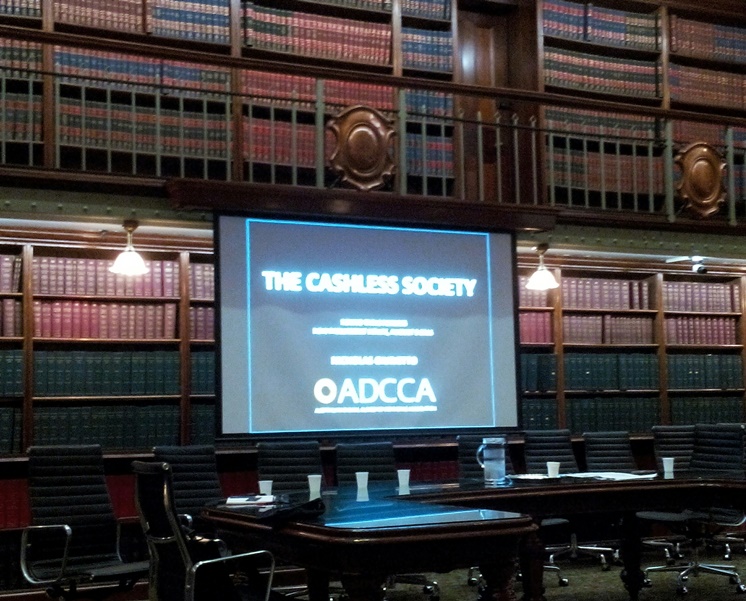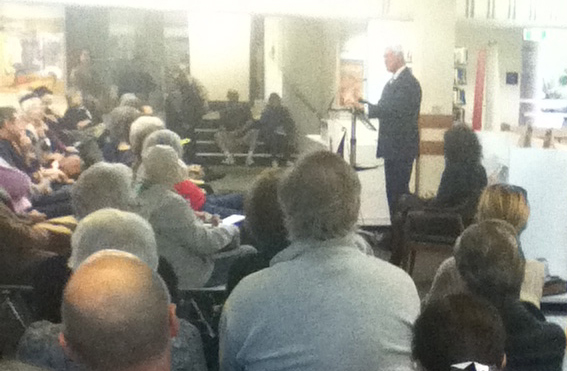A Report into the 36th Round Table Forum of Western Heritage Australia, NSW Parliament House.
On 9 August 2016, Luke Torrisi participated in the Round Table Forum organised by Western Heritage Australia and held at the NSW State Parliament House. Representing the Sydney Traditionalist Forum, Torrisi delivered a lecture on the “Cashless Society” after three other speakers presented the case for the inevitable rise of “crypto-currency” and digital transactions.
This event was the 36th round table forum hosted by Western Heritage Australia, an association dedicated to the public discussion of cutting edge political and social issue and raising public awareness of intrinsic importance. Torrisi’s lecture – his second for Western Heritage Australia – was presented from a philosophical and literary perspective and highlighted the likely dangers and risks in embracing a future where the concept of private property and commercial transactions are reduced to ephemeral status.
In this report, we will summarise the salient points of the first three speakers who provided an introduction to the concept of digital currency and outlined some of its promises and problems, and then provide a summary of Torrisi’s rebuttal.
Michael Kong
The first speaker of the evening was Michael Kong, who was optimistic about the increased interest in crypto-currency and believed that electronic transactions would eventually dominate commercial relationships in the near future. He explained the “block chain” structure of digital currency, using Bitcoin as an example of one popular alternative presently used by enthusiasts of “private currency” who prefer to use a decentralised monetary system after emerging in or about 2010 when a group of individuals under the collective name of Satoshi Nakamoto released a white paper for the fist block chain code.
Kong explained that a block chain is essentially a distributed database which is utilised in peer-to-peer transactions, where the peers host the block chain on their individual computers. He suggested that this creates an environment in which there is no incentive to engage in fraud; the community that uses the Bitcoin “self-regulates and self-polices” its conduct and commercial culture. The code is open source and the digital currency removes the need for a middle-man such as a bank for cross jurisdictional transactions. Kong therefore predicted that the impact of digital currency will also be felt on the consumer end with transaction costs being dramatically reduced, giving the example that a Bitcoin transfer of one million dollars would cost the transferee no more than ten cents.
Problems with digital currency were also noted by Kong, such as the following:
- A “double transaction bug” has been identified, where a transferee was able to effectively spend the same crypto currency twice before the block-chain codes updated and synchronised. Kong claimed that this problem has been detected and the relevant bugs have allegedly been fixed.
- Scalability was another issue that was raised as an obstacle that would have to be overcome: the more transactions are made in Bitcoin, the larger the block chain code will grow. A solution would have to take a combined form of software and hardware evolution as well as the development of the block-chain architecture itself.
- The time taken to validate transactions will also have to be shortened to make the currency more attractive to the market, else digital currencies such as Bitcoin will remain niche media of commercial transaction.
- Ultimately, crypto-currencies would have to become “as ubiquitous as the internet itself” before they become a more viable monetary alternative.
Another question that arose was the issue of regulation. One of the aspects of crypto currency such as Bitcoin is their decentralised character; the digital medium is not subject to government edicts and laws. However, authorities have raised a concern that these kind of transactions can occur in the dark, and may therefore be an attractive method for criminal syndicates to do their business. The possibility that Bitcoin and related currencies may be abused for money laundering and terrorism related offenses is the most urgent concern that will need to be resolved by the industry (i.e. users and the Bitcoin community) and government.
Nick Giurietto (CEO & Managing Director Australian Digital Currency & Commerce Association)
The next speaker was Nick Giurietto, who opened his presentation with a digression on trust, exemplifying his grandmother’s habit of confirming the data in her “bank passport” before allowing herself to use the money allegedly deposited into her account. He noted that the nature of transactions have changed rapidly over the past several decades, but each have satisfied five key elements: they store value, they are a medium of exchange, a unit of account, represent a form of security, and are efficient and convenient. Giurietto held that there would be an inevitable evolution towards the “digital dollar” with Bitcoin moving into other block-chain applications, and in turn forcing the ASX itself to move to adopting an “Australian Digital Dollar”.
Giurietto illustrated that while digital currency may seem to still be in its infancy stage of development, the momentum under which it continues to spread will likely render it a major medium of commercial transaction in the near to distant future. Currently, it is estimated that the circulation of Bitcoin has reached nine billion dollars. The value of Bitcoin has also rapidly increased: in the early stage of Bitcoin usage, a pizza was sold for ฿10,000, however today one Bitcoin is valued at approximately $900 (Australian).
Giurietto stated that “fundamentally it [digital currency] is a database, but it is transparent, everybody an see what’s on it, can observe what’s on it, there is the security because people can check and compare the data integrity.” He added that “this creates the possibility of an electronic asset” for example, a “record share transactions.” Giurietto underlined that the essential value in this new form of currency is its emphasis on trust, the elements of which are:
- Security: the block chain has yet to be seriously compromised; past problems have been associated with mad management habits such as negligent password management. Ultimately, the block chian “remains uncompromised.”
- Accuracy: the block chain is synchronised and records each transaction. In the future digital dollar, it may be impossible to misspend the currency because its use is tracked and can be traced back within the block chain.
- Transparency: the block chain can be inspected and viewed openly by users.
- Immutability: security features mean that problems associated with fraudulent currency are made impossible.
Giurietto explained that the value of electronic money is unlocked by way of computer code only after a contingent condition is met, such as a when goods or services paid for by the crypto currency are actually provided or received. This facilitates easier contract management. An example would be the purchasing of refrigerated perishables where a contractual provision requires that they be kept at a certain temperature while in transit – refrigerated containers which are monitored electronically may be programmed to send a ‘cancelation’ in the event that refrigeration fails. This means that contractual breaches are effectively met with an automatic cancelation of the unlocking code and the vendor will not have the benefit of the transacted money until the matter is resolved with the purchaser.
Problems with the increasing use of digital currency were also noted, such as the following more obvious examples:
- Compliance and tax implications will be difficult to impossible in light of the decentralised nature of Bitcoin.
- Validation systems are still slower than what might be expected of a digital medium of commercial exchange. Giurietto estimated that presently it takes up to ten minutes to validate a transaction.
- Privacy may become a problem insofar as anonymity or pseudonymity may allow criminal enterprises being funded and facilitated by crypto currencies.
- Economic management may also become a problem. Giurietto explained that there is a cap on the money supply of Botcoin, with the last Bitcoin planned to be mined in approximately 100 years.
Giurietto predicted that digital currency may arise as a future global currency, however it is unlikely that Bitcoin itself would be that currency. He noted that various foreign reserve banks are “experimenting” with their digital currencies but that the Australian Reserve Bank has not.
Michael Potter (Centre for Independent Studies)
Michael Potter began by stating that society will eventually have a cashless economy but that “we’re not quite there yet.” He illustrated that the demand for cash was still very high, especially for bank notes of a higher denomination. The use of cheques, on the other hand, have been in significant decline and may go into complete disuse very soon (except perhaps for in the United States, where cheques are still used today, even in supermarkets). Contrarily, debit card transactions have been on the rise, as has been the use of credit cards, direct credits and debits.
Potter discussed the impact of transaction costs on commercial dealings and used cheques as an example of a payment method that will suffer as costs continue to rise. Compared to digital currency, transaction costs will continue to decline and ultimately may even disappear. The implications will be felt most readily in the taxation system if commercial transaction can be facilitated outside present centralised system which is monitored by government authorities. Transactions may therefore continue to move towards the crypto-currency platforms, which are undetectable to all except those involved in the transaction itself.
Effectively, this may render the taxation system itself largely voluntary as more and more people move away from hard currency and begin to favour digital systems for their commercial transaction needs in greater numbers. It is uncertain how government authorities may deal with these developments.
Luke Torrisi (Fellow, Sydney Traditionalist Forum)
Torrisi approached the topic of digital currency and a cashless society from a more philosophical perspective. He stared by explaining that “the first thing about paleoconservatives and traditionalists is that they very instinctive.” Torrisi noted Cardinal Newman, who wrote about the “elative sense”, about the moral distinction between “things being wrong and things being right.” He confessed that:
Some of us wince when we hear about the cashless society. There is a reason for that. There is a reason why we’re not yet a cashless society, and why we feel this affinity [to hard currency]. We will say, isn’t it odd, that of all things our ancestors were so paranoid about was the notion of buying and selling.
Torrisi described that discussions concerning the evolution of money doesn’t satisfactorily appreciate that buying and exchange is “an ethereal thing” and the question of “human scale” doesn’t receive the attention it should. He noted Thomas Molnar’s Utopia – The Perennial Heresy which illustrates that traditionalists see in people who try to seek “perfection” in the world; the attempt to create “utopias” as totalistic systems results from the notion that Man can become his own god. Torrisi added that:
When we look at Man’s various attempts in doing this, we witness this notion of coalescence, where everything having to be brought into a single unity. The utopian sense of a great global currency, that is a great ethereal thing.
He identified the risk that this coalescence, which is a process “that has been progressing slowly from the modern era circa 1500” may well be misused in a manner that inhibits rather than releases human potential, and restricts liberty understood in the classical sense rather than expanding the realm of abstract freedom. Specifically, Torrisi was sceptical about the decentralised nature of the digital currency concept and raised the obvious issue of how governments will seek to control and regulate it:
What I’m concerned about, in this process, why do we want to hand over something that they will want to regulate and control, from Uber to television. Why do we want to hand them over our complete acquiescence…
Likewise, some of the aspects of crypto-currency may turn out to have inherent, hidden risks that threaten liberties. Transparency, for example, was used by Torrisi as one such example: this could very well become a “means of control” by external authorities. Bentham’s panopticon naturally came to mind: a system in which total transparency rendered citizens slaves to the prying eyes of authorities whose benevolence and good intentions would be no compensation for the death of individual privacy. Torrisi also referred to Zamyatin’s We, which was “obviously effected by his experience in the Soviet Union and read by Orwell.” There, the concept of transparency, where “people literally lived in glass buildings” had a similar effect: “this notion of being completely and utterly on display at every time, so that we can be inspected to the last micro transaction.”
He then quoted from correspondence dated 21st October 1939 between George Orwell and Aldus Huxley:
My own belief is that the ruling oligarchy will find less arduous and wasteful ways of governing and of satisfying its lust for power, and these ways will resemble those which I described in Brave New World. I have had occasion recently to look into the history of animal magnetism and hypnotism, and have been greatly struck by the way in which, for a hundred and fifty years, the world has refused to take serious cognizance of the discoveries of Mesmer […] Within the next generation I believe that the world’s rulers will discover that infant conditioning and narco-hypnosis are more efficient, as instruments of government, than clubs and prisons, and that the lust for power can be just as completely satisfied by suggesting people into loving their servitude as by flogging and kicking them into obedience. In other words, I feel that the nightmare of Nineteen Eighty-Four is destined to modulate into the nightmare of a world having more resemblance to that which I imagined in Brave New World. The change will be brought about as a result of a felt need for increased efficiency.
Torrisi pointed out that individuals “are now subject to living on an industrial scale” and that “the world of psychology has studied how to manipulate and control individuals” with most research now being conducted in the field of marketing and advertising. Torrisi continued by describing how “we’re wallowing in comfort, but our psychology is being monitored, nudged and pushed.” Not wanting to fall behind in the cutting edge of innovation, he noted how the larger banks have indeed been looking into cashless transactions while “introducing half way measures to make people get comfortable with having the thing.” He conceded that the threat may not be readily apparent to us, but ethnic and other subgroups have shown a strong loyalty to traditional modes of economic exchange for a reason; these reasons should not be ignored by innovators and social policy analysts:
Think about where these people come from? Why do they feel secure with physical tangible control over the means of exchange. There is a moral function to private property to the paleoconservative. It’s not about ‘the individual’. It’s about the ability to assert resistance as an individual. I’m worried about a world where we cannot make this resistance. I have the function and form of private property through which I can make moral assertions. I lose that at the moment it becomes ethereal. I can be cut off at any moment. When people say that digital currency will be like the Internet, I get a chill up my spine. Every time we place the totality of our experience into electronic media we are in fact giving up to intermediaries. There are no intermediaries when I use cash.
Torrisi then raised the issue of the “human scale.” He claimed that the entire way in which we live and function instinctively and organically must by definition change if our means of exchange is no longer physical. “What seem like silly and petty human interaction are important to us because they allow us to measure ourselves on a human scale” he said, adding that we risk heading towards a trustless economy. “This has left the human scale. It is, man becoming god, I shall be as nimrod and build my tower of Babel, the only limitation are the wonders of the imagination, after all that is all that exists, isn’t it?”
Though Torrisi noted the various pragmatic arguments in favour of digital or crypto currencies. However he noted that his concern was “these bigger and more important philosophical questions, while they may not seem pressing now, they are important in the long terms.” Essentially, he asks: “What will happen to a society in which the means of exchange become so ethereal that I have no means to contact or see properly? The possibility of that, in a government public or private, chills me to the bone. Because it leaves the human scale.” Torrisi concluded with a quote form Matthew Crawford:
Ironically, it is now the managerial elite of international capital that is likely to complain of the false consciousness of those workers on whom the idea of the nation retains some grip (for example those who oppose easy immigration). It is now the capitalist who says, ‘Workers of the world, unite!,’ the better to dissolve those ‘inefficiencies’ in the labor market (that is, high wages) that arise from political boundaries. The slogan once expressed a hope to organise a body of workers who were dispersed and hence exploitable, whereas now it captures the desire for a mass of ‘human resources’, exploitable because undifferentiated. This latter intention is accompanied by all the easy moral prestige of multiculturalism, so it finds its champions on the erstwhile Left. Those at the top of the food chain get a new identity in which to take pride, that of the sushi-eating, Brazilian-girlfriend-having cosmopolitan. But what does the autoworker get as industries lose their national character? It is harder to take pride in one’s work as ‘a Rolls Royce man,’ for example, if the car is assembled from parts made who knows where. One remedy is to find work in the cracks; work the market rational for which is fully contained within a human scale of face-to-face interactions. This is what the speed shop offers; it is a community of making and fixing that is embedded within a community of use. Such enterprises are not ‘scalable’ in the way that whets the appetite of remote investors, much as they might like to explode the happy scene and take it global.
Torrisi added, “simply exchange the notion labour for currency and apply Crawford’s argument” to illustrate how the “propensity for coalescence” is “playing out elements of the Cold War that remain unfinished” which are not in the interest of the host populations of the West or the constituting bodies politic.

Luke Torrisi at the Round Table Forum on the “Cashless Society” (9 August 2016)
– SydneyTrads Editors





Re: private crypto ‘currencies’: https://zippycatholic.wordpress.com/2016/09/19/cryptocurrency-as-cuck-finance-or-promises-made-by-pokemon/
Which of the several hundred crytpocurrencies on offer is to be preferred? […] Jokes aside, I am keen on seeing how the cryptocurrencies play out, and we should let them play out. Paper currency is inherently problematic, a point which does not seem to have been addressed. From an individual’s perspective, is there much difference between having the contents of your Bitcoin wallet stolen by hackers, and seeing $1,000 diminish overnight to $1 courtesy of state-sponsored inflation?